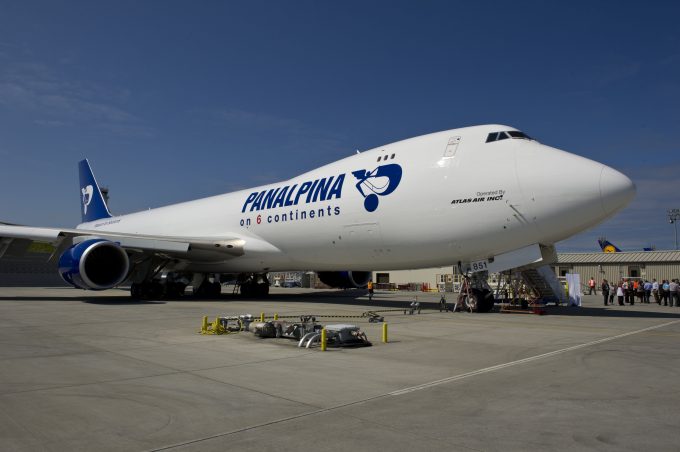Analysis: K+N on a roll, but is Panalpina the next major takeover target?

Atlas Air/Panalpina
While K+N continues to grow profits, thanks to careful management of third-party transport services and soaring gross income, which fully offset rising operating costs, Panalpina – whose market cap and revenue amount to about 20% and 25% of K+N’s, respectively – experienced a material drop in earnings, mainly due to one-offs, spurred by a more cyclical portfolio of clients operating in the oil and gas industry.
Just how bad is the situation for both, and for their global competitors?
Landscape
Notwithstanding the woes of the smaller Swiss forwarder, it can be argued that many other, less cyclical, freight forwarders worldwide are in peril; not only do changing dynamics in the industry pose an obvious risk to their business models, but also a significant growth premium is embedded in their equity valuations at a time when working capital strains on receivables are visible, while shippers appear serious about consolidating accounts of key suppliers, and with them, major transport costs.
The $18bn purchase of Mead Johnson Nutrition by Reckitt Benckiser and the recent attempt by Kraft Heinz to take over Unilever, in a deal that valued the target at over £110bn, reminded us that consolidation along the supply chain could bring more downside risk than upside to forwarders.
Unilever, for example, has deep ties with K+N – but would a change of ownership at the former complicate that relationship?
It is a legitimate question, which emerges as many consumer staple companies boasting global operations – Nestle, Danone, P&G, Colgate Palmolive, to name a few – are rumoured to be possible takeover targets and/or merger candidates, following the move by Kraft Heinz.
Even if a takeover of Unilever doesn’t materialise, there could be bad news around the corner for freight forwarders exposed to that account. When Kraft withdrew its proposal, Unilever was forced to announce a corporate review, aimed at delivering more value to shareholders, meaning possible spin-offs or, more likely, heavy cost-cutting measures that could, ultimately, harm the earnings power of transport and logistics companies that rely on the business of such a heavyweight shipper, both in developed and emerging markets.
The same is happening in the automotive sector, as evidenced by the sale of Opel to PSA yesterday for more than $2bn. And however the integration of production plays out, there is little doubt that the new company’s supply chains will ultimately be transformed.
Returns
As we all know, major freight forwarders are generally well capitalised, but their ability to continue to entertain shareholder-friendly activity must be questioned, as capital allocation strategies and higher shareholder returns have become less predictable than in the past.
Although the economics of global trade remain intact, uncertainty reigns and their stocks continue to trade close to multi-year highs; short-term visibility of sea and air spot freight rates might result in some players negotiating less-lucrative long-term contracts.
“In plain English, (…) forwarders and shippers do not know what they should be paying,” Zvi Schreiber, chief executive of Freightos, argued earlier this year.
Structurally, lower oil prices do not seem likely to boost top-lines of forwarders on a gross basis over the short term, and therefore any gains might not be sustained – hence, damage limitation and earnings preservation could become the name of the game, particularly if major global shippers bulk up further, which is a distinct possibility.
Macro stuff
In this context, a top-down approach prevails on fundamentals, in my opinion, also because both K+N and Panalpina are safe and could exploit their balance sheets to put some new debt to work, at least until debt is dirt cheap – as I have extensively argued in previous coverage of both companies.
In a note to investors on Friday, Royal Bank of Canada wrote that the “market decided this week to take the Fed speak seriously, (with) Yellen, Fischer potentially putting the ‘nail in the coffin’ for a March hike”, while emerging markets started “to turn cranky with rising US rates and dollar”.
“Chinese, Brazilian and emerging-market ETF (are) all breaking trends to the downside,” the broker added, while other press reports talked of investors placing derivatives bet against US shopping malls.
In such a difficult trading environment, Panalpina decided to devote virtually all its free cash flow to dividend payments in 2016, stretching its payout ratio well above 100% on a reported, unadjusted basis, while its larger domestic rival also confirmed it wants to be perceived as a high-yielding machine to attract investors.
Their cash balances are reassuring, but how long before they will become more aggressive in their capital deployment strategies?
Unsurprisingly for those who have read my previous coverage, the stock of Panalpina has been under a huge amount of pressure since it reported annual figures last week, and rightly so, given its trading level of Sfr119, while the shares of K+N have struggled to remain above Sfr140.
Bears are adamant the stars are not aligned for transformational M&A activity among the larger freight forwarders, but market share data in air and sea freight leaves open the debate on who could be next to be taken over among those forwarders outside the top three of DHL, DB Schenker and K+N.
Now, notwithstanding the fact that not all of the data covering the freight forwarding industry is of the highest quality, to put it mildly – financial figures for some forwarders are opaque at best (and downright obfuscated at worst), while some of the volumes numbers our team at The Loadstar have seen are bordering on the mendacious – Panalpina, in my view, still remains one of the most obvious takeover targets in the business.

No comments:
Post a Comment